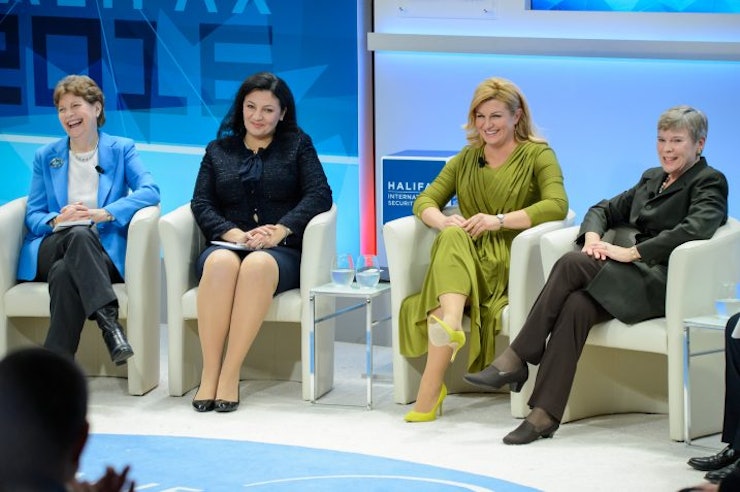Sen. Jeanne Shaheen Explains Why Empowering Women Across The Globe Is Its Own Anti-Terrorism Strategy
By: Bronwyn Isaac
Bustle
The cultural conversation around counter-terrorism often relies on increased national security and military strategies. Certainly, dissecting the pros and cons of anti-terrorist military strategies is an article in itself, but what about more community centered preventative tactics. More specifically, what if global empowerment of women was its own counter-terrorism strategy? Well, according to the New Hampshire Sen. Jeanne Shaheen, an increase in global female empowerment could be its own preventative weapon against violence and terrorism.
Shaheen has served in the Senate since 2009 and is the only woman on the Senate Foreign Relations Committee. She is one of the senators who has been pushing Congress to pass the Women, Peace, and Security Act, a bipartisan measure that would enforce the inclusion of women abroad in conflict resolution and the development of foreign policy, as well as requirs the secretary of state and USAID Administrator to draft guidelines so that staff overseas consult local women in conflict prevention.
"We know when women are at the table when negotiating in conflict areas, they're more likely to get a settlement that will last," Shaheen tells Bustle in a phone interview tied to International Women's Day on March 8. "That's one of the challenges that we're seeing, if we don't empower women and girls, then we're more likely to see conflict."

Shaheen at the all-women "NATO: Necessary" panel at the 2016 Halifax Security Forum
Shaheen believes empowering women around the globe won't just have political benefits, but economic ones, especially at the local level. She cites that women are more likely to invest back into their communities economically than men, a statement supported by a study done by the Clinton Global Initiative, which revealed that on average, working women invest 90 percent of their income back into family and surrounding community, compared to a lower average of 35 percent for men.
"We know this fact, and I had a chance to see this as a part of the foreign relations committee — that when we invest in women and girls they put their investments back into their families and communities compared to men," Shaheen says. "So, 90 percent for women, compared to 35 percent for men."
Shaheen argues that there is a connection between investing in women and stable global communities and the role of women in conflict resolution and prevention. After all, women without education or economic agency don't have the finances to financially invest in stable communities, and therefore, are less likely to have the opportunity to participate in community stabilization and conflict prevention. And according to a report from the The Center on Global Counterterrorism Cooperation "women can be powerful preventers and participate in innovative efforts to mitigate the effects of conflict and violent radicalization."
Shaheen emphasizes the importance of instating the Women, Peace and Security Act abroad, in both its role of giving women a platform to advocate for themselves in the scope foreign relations, but also as a savvy act of counter-terrorism in negotiations overseas.
"I think it's important for us to pass the bill, specifically in relation to some of the countries where we're seeing conflict right now — Iraq, Afghanistan, Nigeria, Somalia, where we've seen the rise of terrorist organizations," says Shaheen. "They're where it'll be important initially to do the implementation because they're dealing with conflict now."
Ultimately, Shaheen stresses that empowering women globally can be a crucial tool in stabilizing communities and fighting terrorism.
"No country can get ahead if half of its people are behind. I think it's not surprising that the countries that we're seeing terrorists come out of, do not provide equal opportunities for women, that have restrictions on women's employment," Shaheen says. "It's in our national security interest to provide support for women and girls around the world."